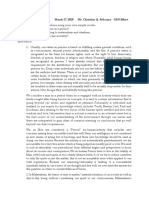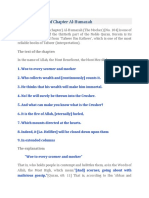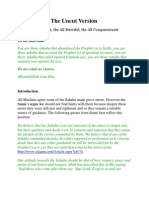0 ratings0% found this document useful (0 votes)
23 viewsOn The Unique Qualities of Man
On The Unique Qualities of Man
Uploaded by
dan1. Man has several unique qualities including self-consciousness, freedom of choice, ability to think and generalize, worship of a higher power, and search for meaning.
2. Self-consciousness allows man to be aware of himself and take responsibility for his actions. Freedom of choice allows man to decide among options, though some philosophies argue choices are predetermined.
3. Man can determine right from wrong through ethical discrimination and consider various ethical theories like utilitarianism. Man acquires knowledge through the senses and reasoning according to theories like empiricism and rationalism.
Copyright:
© All Rights Reserved
Available Formats
Download as DOCX, PDF, TXT or read online from Scribd
On The Unique Qualities of Man
On The Unique Qualities of Man
Uploaded by
dan0 ratings0% found this document useful (0 votes)
23 views2 pages1. Man has several unique qualities including self-consciousness, freedom of choice, ability to think and generalize, worship of a higher power, and search for meaning.
2. Self-consciousness allows man to be aware of himself and take responsibility for his actions. Freedom of choice allows man to decide among options, though some philosophies argue choices are predetermined.
3. Man can determine right from wrong through ethical discrimination and consider various ethical theories like utilitarianism. Man acquires knowledge through the senses and reasoning according to theories like empiricism and rationalism.
Original Description:
---
Original Title
---
Copyright
© © All Rights Reserved
Available Formats
DOCX, PDF, TXT or read online from Scribd
Share this document
Did you find this document useful?
Is this content inappropriate?
1. Man has several unique qualities including self-consciousness, freedom of choice, ability to think and generalize, worship of a higher power, and search for meaning.
2. Self-consciousness allows man to be aware of himself and take responsibility for his actions. Freedom of choice allows man to decide among options, though some philosophies argue choices are predetermined.
3. Man can determine right from wrong through ethical discrimination and consider various ethical theories like utilitarianism. Man acquires knowledge through the senses and reasoning according to theories like empiricism and rationalism.
Copyright:
© All Rights Reserved
Available Formats
Download as DOCX, PDF, TXT or read online from Scribd
Download as docx, pdf, or txt
0 ratings0% found this document useful (0 votes)
23 views2 pagesOn The Unique Qualities of Man
On The Unique Qualities of Man
Uploaded by
dan1. Man has several unique qualities including self-consciousness, freedom of choice, ability to think and generalize, worship of a higher power, and search for meaning.
2. Self-consciousness allows man to be aware of himself and take responsibility for his actions. Freedom of choice allows man to decide among options, though some philosophies argue choices are predetermined.
3. Man can determine right from wrong through ethical discrimination and consider various ethical theories like utilitarianism. Man acquires knowledge through the senses and reasoning according to theories like empiricism and rationalism.
Copyright:
© All Rights Reserved
Available Formats
Download as DOCX, PDF, TXT or read online from Scribd
Download as docx, pdf, or txt
You are on page 1of 2
Mingo, Daniel J.
BS Architecture 4-2
On the Unique Qualities of Man
Self-consciousness, freedom of choice, ethical discrimination, ability to think and to
generalize, worship of a Higher Power, and the search for meaning are some of the said unique
qualities of man.
Self-consciousness is the reason why man is aware of what he looks like, what he is
doing, and what he is feeling. For these reason, self-consciousness is the basis of personal and
social responsibility. Self, I believe, is an abstract thing unlike the corporeal state of a man but
also a way too different from soul. Self, in my thought, is the general term for a being which
composed of the physical body, the soul, and the mind. It refers to the whole idea of what a
human being is.
Freedom of choice is the ability of man to decide and choose among many things.
However, some says illusion is the freedom of choice. Fatalism explains that we have no choice
but to accept what it happening in our life. It is already predetermined and no one can change it.
It is said that every occurrence happens because of the power of fate. Almost the same with
Fatalism is the Predestination. It argues that God created beforehand what will happen to us, to
the world, to everything. We have no choice but to accept the predestined events of our life made
by God. Determinism also concludes that we have no options to choose from. It is the causes and
effects that governs our destiny. It states that we may not be aware but what is happening now is
not our choice but an effect of what we did before. Conversely to the above theories, there is one
that proves that there is really a freedom of choice. It is said that man, being a self-conscious
being, has the ability to think on its own thus can choose a life that he wants to. Man can make
his own destiny.
Mans ability to determine what is right and what is wrong is the ethical discrimination.
Since the essence of life is basically self-preservation in which we protect our human existence
and avoid what would jeopardize us, this concept is the same as the law of survival. From the
definition of ethical discrimination, there arises several ethical theories. Formalism explains that
a moral decision depends on maxims expressed by our reasons. Utilitarianism teaches that a
morally made decision or act is the one that will make everyone happy and contented; the act
should benefit the majority. Legalism says that an act should refer to set of standards that are
prefabricated. These rules are not just guide but rules to be followed. Contrary to Legalism,
Situationalism argues that an act should be decided on a case-to-case basis. Every situation is
different from the other so they need different approaches and not a standards of rules.
We acquire knowledge by means of the information our senses has sensed and
differentiated by our perceptive skills and later conceptualized by our brain. There are some
theories that explains how do we really acquire knowledge. Empiricism claims that knowledge
can only be acquired through experience. True knowledge should be based on our sensory
experiences and if not, then the knowledge is unjustifiable. Rationalism, however, argues that not
the sensory experience but the reason is the foundation of knowledge. It is the intellectual
capacity of man that produces the information from the sensed data. Lastly, Intuitionism states
that knowledge is cannot be sensed or thought but felt. It is said that the ultimate knowledge
lies beyond our senses and minds.
Not all knowledge is true. For this reason, the following theories are created. The
Correspondence Theory states that there is an autonomous truth out of our mind and if a
statement corresponds to that truth therefore the statement is considered to be true. The
Coherence Theory holds that knowledge can be considered true if it does not opposes with the
laws of logic. The Pragmatic Theory argues that an idea is true if it works. This theory relies on
the usefulness, workability and expediency of an idea for it to be deliberated as truth. The
Marxist Theory says that knowledge is considered to be true if it contributes to the social change
and if not then it is worthless.
Worship of a Higher Power can be traced back to the ancient civilization. It is due to the
fact that humans do not have the intelligence to know everything and ability to regulate the
forces of nature that man searched for or created a Higher Being that will save and guide them in
the course of their life. Being in fear of what will happen to the world in the future, man tend to
lean on Someone Who is stronger than them. Over the time, their belief leads to the concept of
religion where people practice rituals, say a prayer, sing chants, and so on. There are the so-
called Great Religions having vast believers. In this modern world full of chaos, these Great
Religions have the greatest potential to save and bring back peace to the world only they take
aside their culture and tradition and talk to each other. Great Religions have the greatest ability to
unite the mankind and live in harmony with each other, with nature, and with God.
You might also like
- Ethics - Paul GlennDocument12 pagesEthics - Paul Glennkim gonzales67% (6)
- 50 Days of Prosperity Series PG Study Notes PDFDocument128 pages50 Days of Prosperity Series PG Study Notes PDFbruceaq100% (10)
- Freedom As A Foundation of EthicsDocument3 pagesFreedom As A Foundation of EthicsGrant Jomar SiadorNo ratings yet
- The Nature of Human NatureDocument17 pagesThe Nature of Human NaturePaulo David100% (1)
- Utilitarianism Vs Deontological TheoriesDocument6 pagesUtilitarianism Vs Deontological TheoriesZulfekar DulmeerNo ratings yet
- 1882 Grainge DaemonologiaDocument196 pages1882 Grainge Daemonologiadruidwitch1734100% (1)
- Ennemoser's History of Magic PDFDocument528 pagesEnnemoser's History of Magic PDFexlibras100% (2)
- REVIEWERDocument8 pagesREVIEWERshakaday ShokshokNo ratings yet
- Freewill Vs DeterminismDocument6 pagesFreewill Vs DeterminismAnushka Ridhi HiraNo ratings yet
- Resolved: It Is Morally Permissible For Victims To Use Deadly Force As A Deliberate Response To Repeated Domestic ViolenceDocument6 pagesResolved: It Is Morally Permissible For Victims To Use Deadly Force As A Deliberate Response To Repeated Domestic ViolenceNICK RAWNo ratings yet
- Authority of ReflectionDocument16 pagesAuthority of ReflectionMorgan OkothNo ratings yet
- Final EthicDocument16 pagesFinal Ethicpaulo_marillaNo ratings yet
- Meta EthicaDocument2 pagesMeta EthicaPhoton ClassroomNo ratings yet
- Development of Knowledge in EthicsDocument4 pagesDevelopment of Knowledge in EthicsDenning KWANNo ratings yet
- Consequences of Evolution and Cultural Bias: Cause and ConsequenceFrom EverandConsequences of Evolution and Cultural Bias: Cause and ConsequenceNo ratings yet
- Final Assignment EthicsDocument7 pagesFinal Assignment Ethicsrich kidNo ratings yet
- Freedom As A Foundation of EthicsDocument3 pagesFreedom As A Foundation of Ethicseys100% (2)
- Readings Standards of Moral Valuation Based On The SelfDocument2 pagesReadings Standards of Moral Valuation Based On The SelfRussel BuragaNo ratings yet
- Free Will Versus Final)Document8 pagesFree Will Versus Final)Ralp Randel EspirituNo ratings yet
- Ethics NotesDocument5 pagesEthics NotesKaycee OceraNo ratings yet
- The Study of EthicsDocument91 pagesThe Study of EthicsJacob SiscarNo ratings yet
- Activity 2 Ethics Pre FinalsDocument3 pagesActivity 2 Ethics Pre FinalsMikko Cadano77% (13)
- EthicsDocument4 pagesEthicsAldea PedreroNo ratings yet
- 02 EMOTIONS AND ETHICS Part IDocument4 pages02 EMOTIONS AND ETHICS Part IManisha WaltzNo ratings yet
- Philosophical Ethics. Running Head: Philosophical Ethics. 1Document5 pagesPhilosophical Ethics. Running Head: Philosophical Ethics. 1Ptar MtishaNo ratings yet
- Moral AgentDocument6 pagesMoral AgentpangytpangytNo ratings yet
- Indian Institute of Technology Palakkad Professional EthicsDocument10 pagesIndian Institute of Technology Palakkad Professional EthicsPavan DakoreNo ratings yet
- Ethics, Assignment 2Document2 pagesEthics, Assignment 2Myles Ninon LazoNo ratings yet
- Ge10 Ethics Module 3Document7 pagesGe10 Ethics Module 3Itsss ClarizzaNo ratings yet
- Chapter 1 - Philosophical PerspectivesDocument3 pagesChapter 1 - Philosophical PerspectivesRonn Louie Pascua BusaniaNo ratings yet
- Ch1 Ethics and Ethical ReasoningDocument4 pagesCh1 Ethics and Ethical ReasoningdalenonatoNo ratings yet
- DeontologyDocument30 pagesDeontologyKervy Jay AgraviadorNo ratings yet
- m1 - 3rd Topic Senses of The SelfDocument4 pagesm1 - 3rd Topic Senses of The SelfKobe Marco VolanteNo ratings yet
- Freedom of The Human PersonDocument19 pagesFreedom of The Human PersonRaffy Jade SalazarNo ratings yet
- Total Depravity (Also Known As Total Inability and Original Sin) Unconditional Election Limited Atonement (Also Known As Particular Atonement)Document15 pagesTotal Depravity (Also Known As Total Inability and Original Sin) Unconditional Election Limited Atonement (Also Known As Particular Atonement)Jesse MathewsonNo ratings yet
- Freedom of The Human Person Intro To PhilosophyDocument49 pagesFreedom of The Human Person Intro To PhilosophyJoshua Paul DauloNo ratings yet
- Assignment in Ethics About Moral Principls by GapoyDocument5 pagesAssignment in Ethics About Moral Principls by GapoyFrednixen Bustamante GapoyNo ratings yet
- The Human Person As An Embodied SpiritDocument19 pagesThe Human Person As An Embodied SpiritJenezarie TarraNo ratings yet
- Fundamentals of EthicsDocument6 pagesFundamentals of EthicsSheryl BernabeNo ratings yet
- DMK - Module8 GE8 ETHDocument10 pagesDMK - Module8 GE8 ETHJINKY TOLENTINONo ratings yet
- ETHICS+ Module 2 CompleteDocument41 pagesETHICS+ Module 2 CompletePhilip James LopezNo ratings yet
- Intro To EthicsDocument10 pagesIntro To EthicsdeangarryNo ratings yet
- Ethics Report Gelaga 1Document10 pagesEthics Report Gelaga 1Marygrace pototNo ratings yet
- Reason As The Guide in Human Action: Aquinas' EthicsDocument6 pagesReason As The Guide in Human Action: Aquinas' EthicsIOSRjournalNo ratings yet
- Freedom of The Human PersonDocument7 pagesFreedom of The Human PersonThreedotsNo ratings yet
- UTS - Unit 1 & 2Document11 pagesUTS - Unit 1 & 2Vienjay AganonNo ratings yet
- Basic Issue of PsychologyDocument29 pagesBasic Issue of PsychologyAnushka SabharwalNo ratings yet
- TOPIC 8-Free Will and DeterminismDocument7 pagesTOPIC 8-Free Will and DeterminismclacyngugiNo ratings yet
- GEC 7 Chapter 1 Topic 4 Freedom As A Foundation of EthicsDocument3 pagesGEC 7 Chapter 1 Topic 4 Freedom As A Foundation of EthicsMichelle AntalanNo ratings yet
- Personhood - Chris PDocument2 pagesPersonhood - Chris PChris Cgc PettingaNo ratings yet
- Unit 5 Lesson 4 Unit 6Document23 pagesUnit 5 Lesson 4 Unit 6Jobert BonielNo ratings yet
- What Is Philosophy?Document8 pagesWhat Is Philosophy?Shajarah SaripNo ratings yet
- Chapter 4Document20 pagesChapter 4Alyssa Grace CamposNo ratings yet
- Introduction To Philosophy of Human PersonDocument3 pagesIntroduction To Philosophy of Human PersonBianca Nathalie NicolNo ratings yet
- Presentation 1Document29 pagesPresentation 1Tahira BukhariNo ratings yet
- Two Big Questions:: Happiness: The First Ethical QuestionDocument4 pagesTwo Big Questions:: Happiness: The First Ethical QuestionvoooNo ratings yet
- Free Will Debate AppoinmetesDocument3 pagesFree Will Debate AppoinmetesLuz Ballesteros GNo ratings yet
- Module Paper 1 UTS - OrataDocument3 pagesModule Paper 1 UTS - OrataKyle Christian OrataNo ratings yet
- Engineering Ethics and Human RightsDocument27 pagesEngineering Ethics and Human RightsOdur MorishNo ratings yet
- Freedom and MoralityDocument2 pagesFreedom and MoralityJerica Lacostales LeosalaNo ratings yet
- Freedom As The Foundation For Moral ActsDocument3 pagesFreedom As The Foundation For Moral Actsdani keyksNo ratings yet
- EthicsDocument43 pagesEthicsMamush kasimoNo ratings yet
- Summary and Evaluation FINAL DRAFTDocument9 pagesSummary and Evaluation FINAL DRAFTPeter Dobbing100% (1)
- Dua After Every Fard'PrayerDocument4 pagesDua After Every Fard'Prayerryan smithNo ratings yet
- 1st & 2nd CommandmentDocument21 pages1st & 2nd CommandmentBellaNo ratings yet
- Learn GraceDocument2 pagesLearn GracepepsiloverNo ratings yet
- Yct - Talk 3Document15 pagesYct - Talk 3Kyle PublicoNo ratings yet
- 2019 - 15 June - Vespers - Saturday of The SoulsDocument8 pages2019 - 15 June - Vespers - Saturday of The SoulsMarguerite PaizisNo ratings yet
- The Explanation of Chapter Al-HumazahDocument4 pagesThe Explanation of Chapter Al-Humazahجامع الحمد بالزاهرةNo ratings yet
- Inter Mirifica DecreeDocument4 pagesInter Mirifica Decreebianca0% (1)
- Sociology Chapter 13 Notes From ReadingDocument4 pagesSociology Chapter 13 Notes From ReadingerwertreertNo ratings yet
- Moralistic Therapeutic Deism by R. Albert Mohler, Jr.Document24 pagesMoralistic Therapeutic Deism by R. Albert Mohler, Jr.Nick_Ma100% (1)
- Morals (1ST QUARTER LESSON) GRADE 11 - SENIOR HIGH SCHOOLDocument5 pagesMorals (1ST QUARTER LESSON) GRADE 11 - SENIOR HIGH SCHOOLthe hobbyist100% (1)
- The Righteousness of GodDocument27 pagesThe Righteousness of GodemmanueloduorNo ratings yet
- Temples Symbols RitualsDocument77 pagesTemples Symbols RitualsSai Yeswanth Purini100% (1)
- Bayaan, Takhsees and NasikhDocument16 pagesBayaan, Takhsees and NasikhHassan Basarally100% (2)
- Istikhara DuaDocument2 pagesIstikhara DuaShakir Sultan100% (1)
- Allegorical Significance of Naguib Mahfouz's Children of Our AlleyDocument7 pagesAllegorical Significance of Naguib Mahfouz's Children of Our AlleyAnonymous OuZdlENo ratings yet
- Paragraph On Christmas 3 (200 Words)Document5 pagesParagraph On Christmas 3 (200 Words)osmanNo ratings yet
- Nature of Citta, Mano and Viññā ADocument15 pagesNature of Citta, Mano and Viññā Abharath_mv7-1No ratings yet
- Doa English VersionDocument2 pagesDoa English VersionRaja Ahmad Zuhairi100% (3)
- Religion Reflection PaperDocument6 pagesReligion Reflection PaperGwen KohNo ratings yet
- Chakra Test ResultsDocument16 pagesChakra Test Resultsminjacob_601721240No ratings yet
- Philpot, J.C - Philpot Sermons Volume 6Document748 pagesPhilpot, J.C - Philpot Sermons Volume 6api-26121206No ratings yet
- IslamDocument22 pagesIslamGem KrisnaNo ratings yet
- Flames of The Faithful-SPREADSDocument16 pagesFlames of The Faithful-SPREADSRose GolsseNo ratings yet
- The Sahaba - The Uncut VersionDocument21 pagesThe Sahaba - The Uncut VersionIqra KhanNo ratings yet
- PattonDocument11 pagesPattonapi-281265917No ratings yet
- Selected Major Works of Ibn 'ArabiDocument8 pagesSelected Major Works of Ibn 'ArabiAbul HayatNo ratings yet

























































































